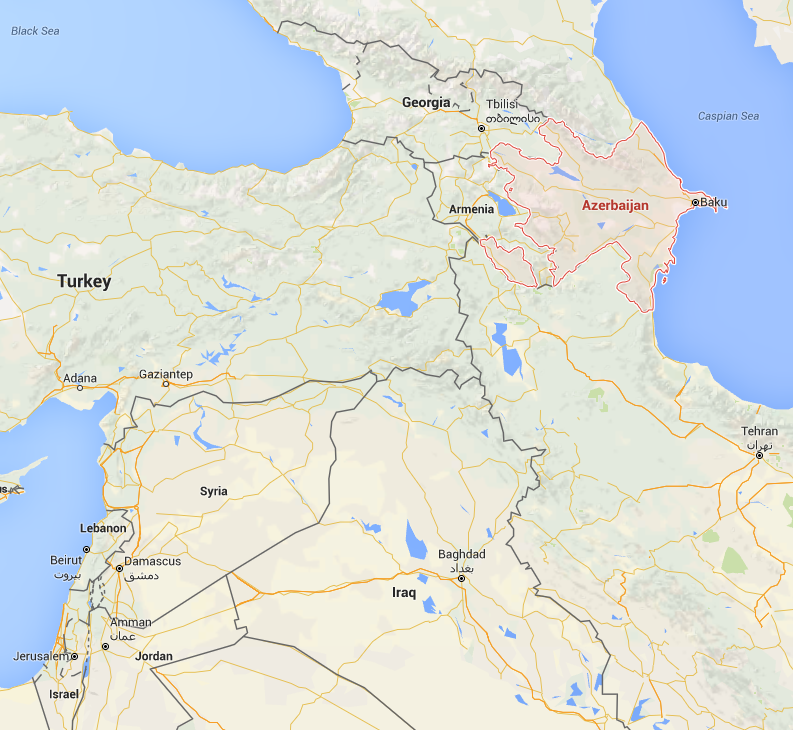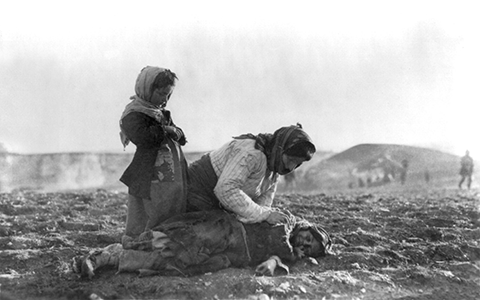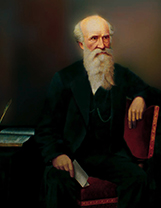
|
Russia’s Next Move on Europe
An aggressive Russia is positioning itself to take more of the Caucasus region, while pushing into Europe.
|
|
Saturday, April 09, 2016
|
www.bibleinthenews.com Audio & Print versions
|
This week Russia has again proven itself relentless in its push against the Caucasus region and the borders of Europe to retake the territory once held by Soviet Union. Conflicts are again flaring up in the Caucasus between Muslim Azerbaijan and Christian Armenia; in the Balkans Estonia, Latvia and Lithuania are shaking in their boots, along with Poland. The USA is sending an additional battalion to Europe to bolster protection against an aggressive Russia along the borders of the former Soviet states.
This week Russia has again proven itself relentless in its push against the Caucasus region and the borders of Europe to retake the territory once held by Soviet Union. Conflicts are again flaring up in the Caucasus between Muslim Azerbaijan and Christian Armenia; in the Balkans Estonia, Latvia and Lithuania are shaking in their boots, along with Poland. The USA is sending an additional battalion to Europe to bolster protection against an aggressive Russia along the borders of the former Soviet states.
Welcome to the Bible in the News.
Stirring up Trouble in the Caucasus.
As we sit comfortably in our homes in the “western world,” having enjoyed thirty years of relative peace from any form of aggression, watching wars fought in exotic places many miles away, the situation is changing as the Russian bear begins to make its move into the Caucasus region, and against the European borders.
The Wall Street Journal headlined with an article entitled “Vladimir Putin’s Next European Front,” carrying a subheading, “A conflict in the Caucasus is the Kremlin’s latest chance to stir trouble in its neighborhood as Washington stands by.” The article, dated April 6, 2016 gave a status report on the region:
Clashes between Azerbaijan and Armenia this week claimed at least 60 lives in the most intense fighting between the neighbors since a 1994 cease-fire “froze” their conflict. Tensions seemed to de-escalate by Wednesday, but clearly the war between Azeris and Armenians is no longer frozen. At stake is the future of a sensitive region dominated by the Kremlin and crisscrossed by Eurasia’s larger political and ideological faultlines.
The article continued:
The conflict is escalating now for a reason: The Caucasus is increasingly shaky. Since the early 1990s, the Armenian-Azerbaijani conflict has been at the center of a political divide in the region. Moscow backed Armenia, and the unresolved conflict kept Armenia tightly in Moscow’s camp. That alienated Azerbaijan, which allied with Turkey and the West in response. Iran, fearful of a secular and oil-rich Azerbaijan courting the U.S., aligned with Armenia and Russia.
So what we are seeing develop is an Armenian-Russian-Iranian alliance, against a Azerbaijan-Turkey-Western Alliance. Exactly, the picture painted by the prophets. The article continued.
Adding to Mr. Putin’s problem in the region, Azerbaijan is the only country bordering both Russia and Iran, and so is crucial to any East-West corridor linking Europe to Central Asia and beyond. Controlling that artery is essential to Mr. Putin’s imperial project...

Strategically positioned, Armenia and Azerbaijan make up part of the Biblical Togarmah
The geographical area of Armenia and Azerbaijan sits on Russia’s underbelly between Georgia and Iran, and sandwiched between the Black and Caspian Seas. Historically, it was settled by the Scythians and became part of the Median empire which combined with the Persians to defeat the Babylonians under Cyrus the Great. It was later swallowed by Alexander the Great’s Grecian empire, and became a key part of the Seleucid Empire when the Greek empire was divided. It was absorbed into the Byzantine Empire until the Islamic Umayyad Caliphate conquered it in the 7th century, and was taken over by the Seljuk Turks, and later by Tamerlane. It has been involved in almost all successive empires of Daniel’s image, (Daniel 2), and under the rule four angels which overflowed the river Euphrates under the 6th Trumpet of Revelation (Revelation 9:13-21). Although it is considered by some a “backwater” today, the region has played heavily into Bible Prophecy. It is part of the region that will play a role again, joining with Gog and Russia under the name of Togarmah as is described in Ezekiel 38:
“Gomer, and all his bands; the house of Togarmah of the north quarters, and all his bands: and many people with thee.” (Ezekiel 38:6)
Togarmah describes the region of the Caucasus between the Black and Caspian seas and encroaching into the area of Turkey. This area is to be “guarded” by Russia as Ezekiel continues on to describe to us:
“Be thou prepared, and prepare for thyself, thou, and all thy company that are assembled unto thee, and be thou a guard unto them.” (Ezekiel 38:7)
So it is no surprise to see Russia stirring up strife in the region, as a pretense for involvement, following the pattern of what took place in the Ukrane. The Wall Street Journal described the area as “oil rich,” outlining further motives for Russia to desire the region be under its control.
Due to the areas long history, the former Soviet Republics are polarized, Armenia being largely ethnic Christian, while Azerbaijan is largely Muslim. Armenians were oppressed under the Ottoman Empire when they pushed for more rights, with an estimated 300,000 people killed during state-sponsored massacres during 1894 and 1896.

A mother mourns of the loss of her child during the Armenian Genocide.
Between 800,000 and 1.5 million Christian Armenians were killed
by the Ottoman Turks during the Armenian Genocide in WWI
It was in World War I the Ottoman government was overthrown by the Young Turk Revolution, and the Armenian province came under great pressure. Eugene Rogan in his book the Fall of the Ottomans, details the Armenian massacre (pp159-184). When Russia entered the war on the opposite side of the Ottomans, the Turkish government feared the Christian Armenians would side with the Russians and began a policy of genocide which included killing all able-bodied men and death marches of women children and the elderly into the Syrian desert. It is estimated that between 800,000 and 1.5 million were killed during this period in what has become to be known as the Armenian genocide. Consequently, Armenia and Turkey have long had strained relations and for good reason. Following WWI, the Armenian province established independence from the Ottoman Empire in May 1918, and the two have remained hostile ever since. The Muslim state of Azerbaijan is supported by largely Muslim state of Turkey, which keeps stoking the tension.
In an article entitled “After facing off for decades, Armenia and Azerbaijan start shooting,” the Economist reported the following:
With so many conflicts in the world, Nagorno-Karabakh [this region] gets little attention. The bloody fighting between Armenian and Azerbaijani forces in the mountainous enclave this week was a reminder that it should. Tanks and artillery traded fire; at least 50 people were killed in four days. The spectre loomed of a wider war, one that could draw in Russia, Turkey and Iran. A ceasefire brokered in Moscow on April 5th appears to be holding for now. But it brought the two foes no closer to peace.
The article also implicated Turkey in the regional war:
Some on the Armenian side suggested that Turkey, a longtime ally of Azerbaijan and new foe of Russia, helped provoke the violence. Turkey’s president, Recep Tayyip Erdogan, fueled the speculation by declaring that he would stand by Azerbaijan “to the end”.
It also points out Russia’s involvement in the region:
Moscow has closer ties with Armenia: it has a military base there and a treaty obligation to defend the country against attacks on its territory (excluding Nagorno-Karabakh).
Vladimir Putin has called for “restraint” in the region, but don’t let this fool you, he did the same thing in Ukraine while Russian troops became covertly involved, and Russia ended up annexing the Crimea. The Wall Street Journal also added:
Little wonder, then, that Mr. Putin would use an unresolved conflict to try to undermine this neighboring government, as he has done in Ukraine. Few doubt Moscow’s covert ability to do so. It’s notable, for example, that the 2014 escalation of the conflict coincided with Mr. Putin’s efforts to elbow France and the U.S. out of the peace process through a unilateral summit he convened in Sochi. This year, the renewed fighting coincided with Mr. Obama’s Nuclear Security Summit and [Azerbaijan’s President] Mr. Aliyev’s first visit to Washington in 10 years. Mr. Putin benefits from reminding both parties (and the West) of his ability to wreak further havoc in a region already marred by conflict, lest they toe his line.
Russia Wins Because it Waits
The whole region is under pressure from an increasing Russian expansion, as was witnessed in Georgia this past week. In an article entitled, “Vladimir Putin’s mysterious moving border,” we read the following this week in the European edition of Politico:
Georgia—The farmers awoke to find their wheat ripening inside another country. South Ossetian troops and their Russian allies had worked through the night, sinking new border-marking poles across fields outside a hamlet called Tamarasheni in the golden hills of central Georgia. Russian and Ossetian troops creep out after dark to move the unofficial line—usually only a few yards, but once by more than a mile—deeper into Georgia.
Frustrated Georgian residents sum up the situation:
“We feel abandoned,” said a elementary school teacher in the village of Dvani, whose classes, once numbering dozens of students, have shrunk to four. “We are tired. People are ready to give up. We are alone. Russia never gets tired. It will win because it waits.”
Russia wins because it waits, and we can expect further conflict in the region as the Russian bear moves in to bring the region, indented by Ezekiel as allied with Gog, into its influence once again.
The growing conflict between Russia and Turkey also plays into this regional strategy. James B. Foley, the former Deputy Chief of Staff to the NATO Secretary General in Brussels, stated in a Time Magazine article entitled “Don’t Let Putin Destroy NATO,” the following:
Vladimir Putin has been remarkably candid about his strategic goal: to roll back the historic losses suffered by the Soviet Union at the close of the Cold War, and to restore Russia’s status and prestige as a great power and peer competitor of the U.S. This ambition has profound consequences for the whole of Europe….
…even historic NATO member Turkey, guardian of the Alliance’s strategic southeastern flank, faces a burgeoning Russian military buildup across its border in neighboring Armenia, while simultaneously being squeezed by Russia’s military intervention across its border with an imploding Syria.
It could indeed be argued that Putin’s ultimate aim is no less than to achieve the age-old Soviet goal of breaking up NATO and driving the U.S. out of Europe once and for all….
The article continued to describe Russia’s military expansion in the region:
Russia has been aggressively expanding its footprint around Turkey’s borders—in Syria to the south, in Crimea and Ukraine to the north, and—most recently—Armenia to the east. Over the past year alone, the Russian military has deployed advanced drone aircraft, helicopter gunships and ballistic missiles into Armenia. Little known is the fact that Armenia has also welcomed an estimated 5,000 Russia military personnel and hosts two Russian military bases—including one within several miles of Turkey’s border. Given the chaos Turkey is facing in Syria to the south and the potentially destabilizing spillover from the conflict inside Turkey itself, as evidenced by the recent horrific terrorist attacks in Ankara and Istanbul, it is clear that Russia aims through the pressure of encirclement to intimidate if not destabilize Turkey and bend its foreign policy to its will.
This comes as no surprise to Bible Prophecy students. The Bible predicts the expansion of Russia into the area of Turkey, the “him” of Daniel 11.:
“And at the time of the end shall the king of the south push at him: and the king of the north shall come against him like a whirlwind, with chariots, and with horsemen, and with many ships; and he shall enter into the countries, and shall overflow and pass over. He shall enter also into the glorious land, and many countries shall be overthrown: but these shall escape out of his hand, even Edom, and Moab, and the chief of the children of Ammon.” (Daniel 11:40–41)

John Thomas writing in the Herald
in 1853 predicts Russia's move
against Turkey and Muslims.
John Thomas, writing in the Herald in 1853, had the following to say:
Let the faithful then “watch;” for when the war against the Moslem breaks forth to the complete evaporation of his dominion, it comes as a storm from the north, sounding in the expectant’s ear, “Behold, I come as a thief! Blessed is he that watches, and keeps his garments.” Russia’s mission is to subvert the Ottoman dominion; and to lead the Catholic idolators of the East and West, who repent not of their deeds, against Jerusalem; that they may there receive an overthrow from “the kings of the east,” which shall inaugurate that judgment which shall sit when the books shall be opened, and the time comes for the saints to possess themselves of the kingdom under the whole heaven. For “the king of the north shall come against him (the Moslem) like a whirlwind, with chariots, and with horsemen, and with many ships; and he shall enter into the countries, and shall overflow, and pass over. He shall enter also into the glorious land (Palestine), and many countries shall be overthrown; and the land of Egypt shall not escape.” Such is the crisis the Frogs are creating for the world; and such is the beginning of the solution of the vexed question of the East.
For more on this we direct the listener to the Bible Magazine, Volume 29, Issue #1 and page 28 and an article by Paul Billington entitled, “Russia, Turkey & the Deliverance of Israel.”
We are not "Passive Observers"
It isn’t only in the area of the Caucuses that the temperature is rising. Growing hostilities in the area of the Baltic in Northern Europe and including the former Soviet states of Estonia, Lithuania, and Latvia have provoked a response from NATO and the USA.
The Newsweek carried an article with the headline, “NATO Will Send Tanks to Help Defend Eastern Europe Against Russia,” which stated:
NATO will shore up Eastern European defenses in the face of an “aggressive Russia” with thousands of troops and tanks, U.S. General Philip Breedlove said. The deployment of the new armored brigade comprising of an additional 4,200 troops and over 200 tanks will be rotational, as is the rest of NATO’s presence in the former Eastern Bloc, and will begin work in February 2017. The initiative forms a more assured plan to increase defenses in NATO’s six easternmost states: former Eastern Bloc countries Bulgaria, Romania and Poland, and former Soviet republics Latvia, Lithuania and Estonia…. “This army implementation plan continues to demonstrate our strong and balanced approach to reassuring our NATO allies and partners in the wake of an aggressive Russia in Eastern Europe and elsewhere,” Breedlove, the top U.S. commander in Europe, said on Wednesday.
The Mail Online reported the US is sending F-15 fighter jets to Iceland and the Netherlands this week as well:
The United States has deployed 12 F-15C Eagle fighter jets and and approximately 350 airmen to Iceland and the Netherlands.
According to CNN, the F-15 fighter jets are part of several deployments of American fighters being sent to Europe in an effort to deter further Russian aggression in the region.
The Russian response was given by Russia’s ambassador to NATO, Aleksandr Grushko, and reported by Radio Free Europe:
"Of course, our response will be completely asymmetrical. It will be calibrated to match our ideas about the degree of military threat, to be most efficient and not overly expensive. We can see that the United States continues to increase its military presence in Europe with an emphasis on the eastern front... We are not passive observers. We consistently implement all those military measures that are necessary to offset this totally unjustified increased military presence," he said.
So Russia is not only pushing south into the Caucasus region, but West into Europe, targeting the former Soviet States in an attempt to bring them back under the control of mother Russia.
As we watch the Bible in the News this week, we see Russia pushing into Georgia, Armenia and Azerbaijan, which comprise the area of Togarmah – part of the Gogian alliance in the time of the end. We see hostilities escalating between Russia and Turkey, the target the King of the North in Daniel 11. We see Russian aggression pushing toward Easter Europe, provoking fear and a defensive response from NATO. The Russian bear is on the move, it is preparing and preparing for itself as Ezekiel 38:7 tells us. This being the case, it is time for us to prepare ourselves for the coming of the King of Kings who will defeat armies of the nations as they come against Jerusalem to battle:
“Knowing the time, that now it is high time to awake out of sleep: for now is our salvation nearer than when we believed. The night is far spent, the day is at hand: let us therefore cast of the works of darkness, and let us put on the armour light.” (Romans 13:11-12).
If the Lord has no returned this following week to call his saints to him, join us again for the Bible in the News.